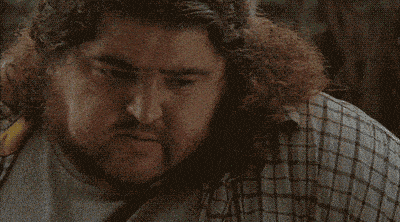magine waking up and realizing that everything—your memories, your surroundings, the people you love—might be a fabrication of your own mind. Now imagine that the only way to “fix” it is to embrace something even more impossible: that the delusion is actually real.
That’s the psychological trap Hugo “Hurley” Reyes finds himself in during Lost Season 2, Episode 18 (Dave). It’s not just an existential crisis—it’s a terrifying war between perception and belief, where the stakes are his survival.
Hurley vs. "Reality"—When Your Mind Becomes the Enemy
By this point in Lost, Hurley has cemented himself as the heart of the group. He’s warm, funny, and deeply empathetic, but behind that easygoing nature is a man haunted by guilt and self-doubt. We know that before the crash, he spent time in Santa Rosa Mental Health Institute, struggling with what seems to be depression, hallucinations, and compulsive behaviors.
And now, on the island, he’s seeing Dave. Again.
At first, it seems like stress or exhaustion could be triggering old patterns. But then Dave starts talking. And what he says is chilling: The island isn’t real. The crash never happened. You’re still in Santa Rosa, trapped in a delusion.
This isn’t just some harmless ghostly vision. Dave is actively trying to convince Hurley that everything around him is an illusion. And worse, he’s eerily logical about it. His argument is persuasive because it preys on Hurley’s deepest fears—that his mind is broken, that he hasn’t really changed, and that the only way out is to “wake up” by ending it all.
The Paradox of Delusion: What Happens When Reality Becomes the Lie?
The genius of Dave is that it turns the concept of a delusion inside out. Typically, a delusion is a false belief that someone holds despite clear evidence to the contrary. But what happens when the delusion itself tells you that reality is false?
This is where Hurley’s situation becomes psychologically fascinating. Most people use external validation to determine what’s real—confirmation from others, logical consistency, and physical interaction. But what if all of those things are compromised? What if the very mechanism we use to check for reality also malfunctions? That’s the terrifying paradox Hurley faces.
Searching for an Anchor—How Do You Know What’s Real?
One of the most gut-wrenching aspects of the episode is watching Hurley desperately try to find an anchor—something to confirm whether he’s really on the island or trapped in his own mind. This is a fundamental human instinct: we look for something solid to hold onto when reality feels unstable.
Hurley’s attempt to ground himself takes different forms:
Testing his senses – He physically interacts with Dave, hoping to disprove his existence. But hallucinations can feel real.
Checking with others – He tries to gauge whether people around him react to Dave. But is that reliable? If this is all a delusion, wouldn’t his mind fabricate their responses, too?
Looking for inconsistencies – Dave’s logic is persuasive, but does it hold up? The moment of hesitation when Hurley considers how the photos in Santa Rosa wouldn’t logically fit into his current world is a key moment.
Ultimately, what saves Hurley isn’t external proof. It’s a leap of faith. He chooses to believe in the reality he wants to live in—one where he is present, where he matters, and where the people around him are real. He chooses life.

Facing an Existential Crisis? Discover Clarity and Purpose with 4MEIA’s Personalized Assessment!
Why It Works—The Emotional Weight of the Scene
What makes Dave so powerful isn’t just the intellectual puzzle—it’s the emotional core. The episode taps into something deeply human: the fear of losing control over our own minds.
Hurley’s story is about more than just mental illness or hallucinations. It’s about trusting oneself. He has spent years feeling like he’s broken like he can’t trust his perception. But in this moment, he takes control. He rejects the voice telling him to give up—not because of proof, but because he chooses to believe in something better.
That’s a profound message that extends far beyond the show itself. Whether struggling with mental health, self-doubt, or trauma, we all need anchors. We all need something to hold onto when reality feels uncertain.
Final Thoughts: Faith, Reality, and the Power of Choice
Lost has always been about belief—faith versus reason, destiny versus free will. But Dave is unique in that it forces one of its most grounded characters to wrestle with an entirely different kind of faith: the belief in his own mind.
Hurley doesn’t win because he finds undeniable proof that the island is real. He wins because he chooses to believe in it.
And in the end, maybe that’s what keeps us going—not certainty, but the belief that, despite everything, our experiences matter.
Assessing reality has never been more critical—especially in an era where misinformation spreads faster than facts, and influential figures like Elon Musk can shape entire narratives with a single tweet. In a world where deepfakes, conspiracy theories, and AI-generated content blur the line between truth and fiction, Hurley’s struggle in Lost serves as a powerful reminder: when reality feels uncertain, finding a reliable anchor—whether it’s evidence, trusted sources, or our own reasoned judgment—is the key to staying grounded.
"The Man Who Mistook His Wife for a Hat" by Oliver Sacks – A deep dive into neurological conditions that distort perception.
"The Center Cannot Hold: My Journey Through Madness" by Elyn R. Saks – A firsthand account of living with schizophrenia and reclaiming reality.
"Madness and Civilization" by Michel Foucault – A historical and philosophical look at how society defines and treats mental illness.

The content on PSYCHEFLIX is for informational and entertainment purposes only and is not intended as medical advice. Always consult a healthcare provider for diagnosis and treatment. Reliance on any information from this blog and newsletter is solely at your own risk.
This newsletter may include advertisements and affiliate links. We earn commissions from purchases made through these links, supporting our mission to provide you with valuable content.


